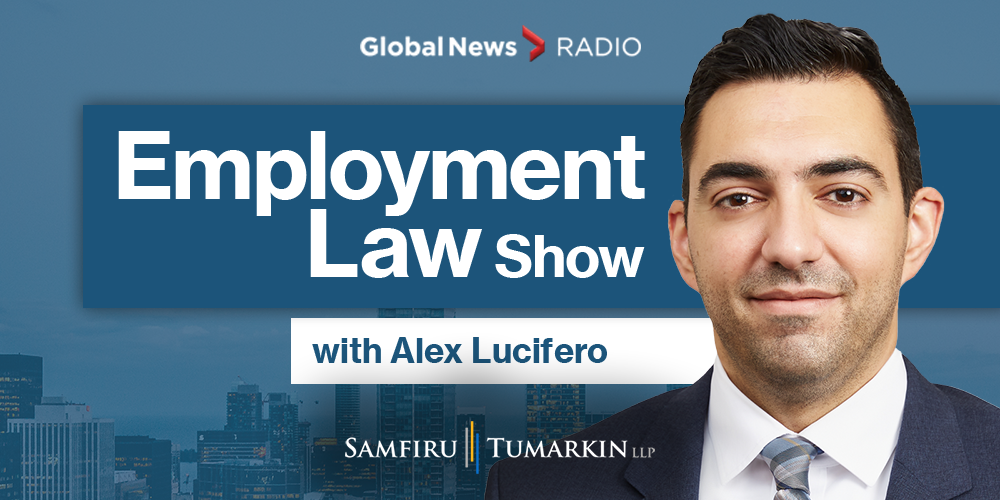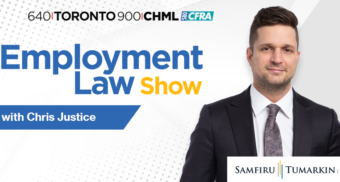Employment Law Show 640 Toronto – S9 E80

Episode Summary
Terminated after being on a temporary layoff, vaccinations in the workplace, and more on Season 9 Episode 80 of the Employment Law Show on Global News Radio 640 Toronto.
Listen below as Employment Lawyer Alex Lucifero, Partner at Samfiru Tumarkin LLP, reveals your workplace rights in Toronto and the GTA on the Employment Law Show. Andrew shatters myths and misconceptions about severance pay, terminations, workplace harassment, overtime pay, wrongful dismissal, constructive dismissal, duty to accommodate, independent contractors, and more.
Listen to the Episode
Episode Notes
I’m in my seventies and worked for a manufacturer for 21 years. The plant is now closing. I have been given 8 weeks’ notice, but no severance. Am I owed anything?
A company’s decision to close up shop does not impact your right to a full severance package. You and your coworkers are still owed severance. An older employee with over 20 years of service with a company may be entitled to as much as 24 months’ pay, minus the 8 weeks of working notice. Only when a company closes because it has officially declared bankruptcy is it next to impossible to obtain severance. Employees who find themselves in this situation should contact a Toronto employment lawyer immediately to find out what their rights are.
LEARN MORE
• Employment Rights When a Company Closes
• How to calculate severance pay
I’m 60 years old, and I’ve been with the same company for about 15 years. I was let go and was offered a year’s pay. Is that the right amount?
You’re actually entitled to closer to the 16 to 18 months’, not the 12 months. So there’s another 4 to 6 months on the table there. Just because you might feel like an offer is reasonable, whether it’s to do with severance or otherwise. When it comes to your employment, even though you feel like it might be reasonable, it’s still good to get advice in any situation.
Can a company that’s going out of business avoid paying severance by changing its name?
The short answer is no. I don’t care what name you call the company. If you are employed by them and they are ceasing your employment, then they owe you severance, whatever they’re called again. The only way that an employer could avoid the liability of severance is by going bankrupt. They’re going into Receivership. An employer can’t just claim that they’re bankrupt, they actually have to file for bankruptcy. There has to be trustees and accounting agencies appointed – it’s a formal process. So no, I don’t think a name change would change anything.
LEARN MORE
• Employment Rights When a Company Closes
I got injured at work last week, and I lost three days of work. WSIB won’t compensate me for my lost wages. What can I do?
You could appeal the decision by WSIB, and contest it. Also, if you’re currently medically unable to work keep in mind that your employer needs to be given a doctor’s note confirming you’re unable to work. If they have that, they can’t punish you for taking a medical leave, they can’t let you go, and they can’t treat you any differently because you’re on a medical leave for absence.
If you employer has a short-term disability policy, or if there are any other kinds of benefits you can use, maybe there’s sick days, maybe you can even use some vacation days. But barring an appeal there may be little you can do on the WSIB front.
TOP QUESTIONS ABOUT TEMPORARY LAYOFFS
Are employers allowed to temporarily layoff employees?
The assumption that temporary layoffs are allowed is an incorrect one. An employer actually can’t lay you off, in most cases, about 90% of the time. An employer can’t temporarily layoff an employee without their consent. If you’re an employee and you’ve been temporarily laid off, you don’t necessarily have to accept that change. That’s the starting point when we’re talking about temporary layoffs. An employee can contest and dispute a temporary layoff, and it makes sense, because you can get your severance and move on to bigger and better things.
How long can a temporary layoff last in Ontario?
For those employees who have been temporarily laid off, COVID-19 has implemented new rules when it comes to layoffs. Layoffs are now effectively being called ‘Effective Disease Emergency Leave’. As of right now, this Effective Disease Emergency Leave is scheduled to end on September 25th. If you’ve been temporarily it off, you want to get advice in your situation because it could very well be that you don’t have to accept the layoff, and that you can choose to treat your employment is terminated and get severance and move on with your career. Again, nine out of 10 times, that’s going to be the better, the better options. I think that’s the most important takeaway.
LEARN MORE
• Ontario extends COVID-19 layoffs AGAIN
Does someone have to return to work if their employer calls them back?
If you are on a layoff temporarily and you’ve been called back to work and you refuse to go back, you don’t have to return to work. If you refuse to return to work, it’s effectively a resignation. If you want to keep your job, if you want to continue your employment moving forward, you probably do want to accept the layoff.
If you’ve accepted it temporarily, what you might want to do when you go back to work is put in writing to your employer. Because the big risk when it comes to temporary layoffs is that if an employer lays you off, once they will likely be able to do it moving forward into the future time and time again.
If you decide to go back to work after a temporary layoff, can your employer make changes to pay position, or location?
Another kind of key fact that I will advise employees on when they’re returning back to work or even in the context of COVID-19, employers were trying to cut people’s salary and change their positions and double up workloads. You don’t want to accept your employer making changes to your pay or your position when you’re coming back from a layoff. You don’t have to accept those kinds of significant changes as an employee.
That’s a constructive dismissal. And when an employer does implement a cut to your pay or a change to your position, or workload, that’s such a significant change to the terms of your employment, you’re allowed to refuse that change. If this is a situation you find yourself in, you have to get legal advice right away.
What if your employer wants to put you in a different position because your position no longer exists? Can you try it and ask for your original job back later?
Most employees will be able to tell very quickly whether a different position or a change you duties is going to be positive or not. There could be exceptional circumstance if you’re not sure about a position and you’re interested in trying it out, go ahead and try it. But you have to have a clear understanding with your employer in writing first. If it’s not that clear when you’re trying out that different position temporarily, then your employer might try and force you to stay in that position.
What if I’m temporarily laid off and I’m not called back at all?
You can’t just wait around indefinitely on temporary layoff. If you’re not called back to work, that’s a termination. You can claim termination, and you’re owed severance. Severance is based upon your age, your years of service with the company, and your position. The older you are, and the more senior your position is, the more severance you’re going to get.
How long do I have to pursue my severance after layoff?
You have two years from the date of your termination to pursue severance. But in the case of a layoff it wouldn’t be from the date the layoff started, it would be from the date that you decided to treat the layoff as a termination.
Should I accept a temporary layoff?
Don’t accept a temporary layoff. Treat it as a termination immediately and get your severance and move on. If you’ve been on a temporarily off for an extended period of time, COVID-19-related or not, make sure you get advice now.
Years ago I worked for a company and sustained injuries at work. I took it to the tribunal, but the case was denied. Is there anything else I can do?
If all of this happened over the course of nine years ago, you’re out of time for any other action. There’s no wrongful dismissal or human rights case or any other case really outside of a WSIB claim. You’ve gone through the full gamut of going through an appeal and a hearing.
For any employment issue, there is a limitation period of two years from the date of an event to commence legal action. After that two-year mark, your time is up, and you cannot pursue an employer within the court system.
A friend of mine was working at a long-term care facility and has to get the vaccine or go on unpaid leave. What are their options?
When it comes to vaccinations in the workplace our governments are developing a patchwork system. Until the Ontario government actually mandates that employees have to be vaccinated in the workplace, an employer cannot force an employee to be vaccinated In the private sector. Employers should also be flexible and not force their employees to be vaccinated at work. They’ll have to allow other accommodations like mask-wearing in the workplace.
LEARN MORE
Can My Employer Mandate the COVID-19 Vaccine?
I just started back at work last and the company let me go. They offered my 52 weeks’ pay after 23 years of employment. What are my rights?
When somebody comes back from a medical leave of absence and is instantly let go that raises the red flag. That’s potentially discrimination on the basis of disability. If that disability leave had anything to do with the company making the decision to let you go, that’s a human rights violation. Since you’re in your sixties in a management position with 23 years of service, you could easily be owed 24 months’ of pay.
LEARN MORE
Severance Pay for Long-Term Employees




